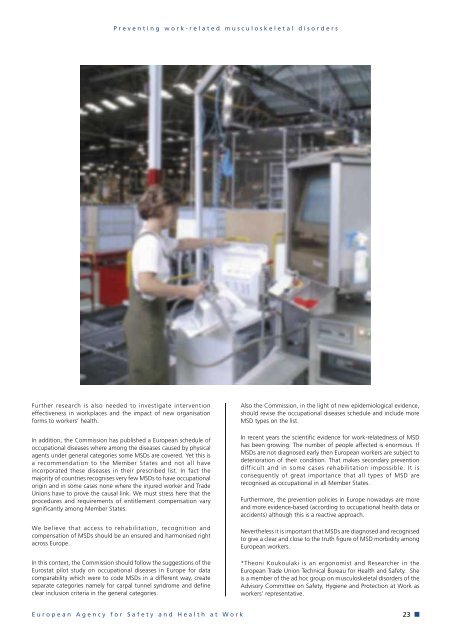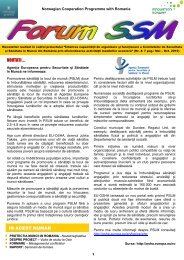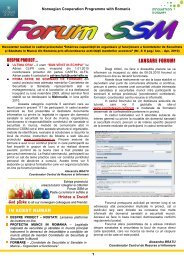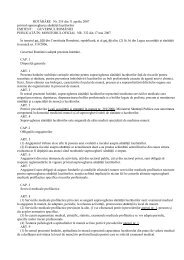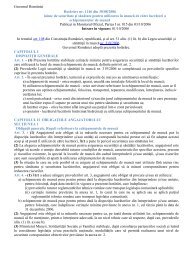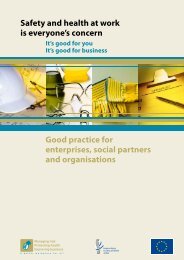Preventing work-related musculoskeletal disorders - European ...
Preventing work-related musculoskeletal disorders - European ...
Preventing work-related musculoskeletal disorders - European ...
You also want an ePaper? Increase the reach of your titles
YUMPU automatically turns print PDFs into web optimized ePapers that Google loves.
<strong>Preventing</strong> <strong>work</strong>-<strong>related</strong> <strong>musculoskeletal</strong> <strong>disorders</strong><br />
Further research is also needed to investigate intervention<br />
effectiveness in <strong>work</strong>places and the impact of new organisation<br />
forms to <strong>work</strong>ers’ health.<br />
In addition, the Commission has published a <strong>European</strong> schedule of<br />
occupational diseases where among the diseases caused by physical<br />
agents under general categories some MSDs are covered. Yet this is<br />
a recommendation to the Member States and not all have<br />
incorporated these diseases in their prescribed list. In fact the<br />
majority of countries recognises very few MSDs to have occupational<br />
origin and in some cases none where the injured <strong>work</strong>er and Trade<br />
Unions have to prove the causal link. We must stress here that the<br />
procedures and requirements of entitlement compensation vary<br />
significantly among Member States.<br />
We believe that access to rehabilitation, recognition and<br />
compensation of MSDs should be an ensured and harmonised right<br />
across Europe.<br />
In this context, the Commission should follow the suggestions of the<br />
Eurostat pilot study on occupational diseases in Europe for data<br />
comparability which were to code MSDs in a different way, create<br />
separate categories namely for carpal tunnel syndrome and define<br />
clear inclusion criteria in the general categories.<br />
Also the Commission, in the light of new epidemiological evidence,<br />
should revise the occupational diseases schedule and include more<br />
MSD types on the list.<br />
In recent years the scientific evidence for <strong>work</strong>-<strong>related</strong>ness of MSD<br />
has been growing. The number of people affected is enormous. If<br />
MSDs are not diagnosed early then <strong>European</strong> <strong>work</strong>ers are subject to<br />
deterioration of their condition. That makes secondary prevention<br />
difficult and in some cases rehabilitation impossible. It is<br />
consequently of great importance that all types of MSD are<br />
recognised as occupational in all Member States.<br />
Furthermore, the prevention policies in Europe nowadays are more<br />
and more evidence-based (according to occupational health data or<br />
accidents) although this is a reactive approach.<br />
Nevertheless it is important that MSDs are diagnosed and recognised<br />
to give a clear and close to the truth figure of MSD morbidity among<br />
<strong>European</strong> <strong>work</strong>ers.<br />
*Theoni Koukoulaki is an ergonomist and Researcher in the<br />
<strong>European</strong> Trade Union Technical Bureau for Health and Safety. She<br />
is a member of the ad hoc group on <strong>musculoskeletal</strong> <strong>disorders</strong> of the<br />
Advisory Committee on Safety, Hygiene and Protection at Work as<br />
<strong>work</strong>ers’ representative.<br />
<strong>European</strong> Agency for Safety and Health at Work<br />
23


